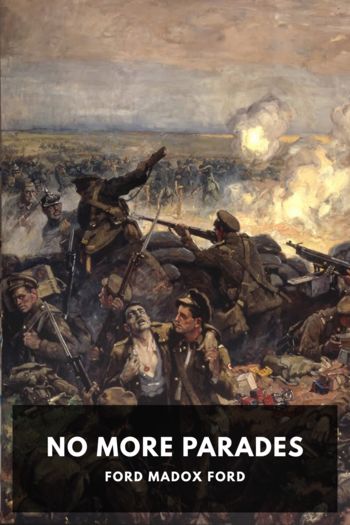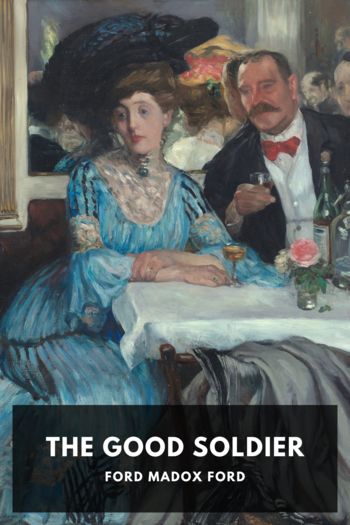Some Do Not … by Ford Madox Ford (story read aloud txt) 📕

- Author: Ford Madox Ford
Book online «Some Do Not … by Ford Madox Ford (story read aloud txt) 📕». Author Ford Madox Ford
His mind stopped for a moment and his eyes gazed dully at Sylvia’s letter which lay open on the tablecloth. His thoughts came together, converging on the loosely-written words:
“For the last nine months a woman …”
He wondered swiftly what he had already said to Port Scatho: only that he had known of his wife’s letter; not when! And that he approved! Well, on principle! He sat up. To think that one could be brought down to thinking so slowly!
He ran swiftly over what had happened in the train from Scotland and before. …
Macmaster had turned up one morning beside their breakfast table in the farm house, much agitated, looking altogether too small in a cloth cap and a new grey tweed suit. He had wanted £50 to pay his bill with: at some place up the line above … above … Berwick suddenly flashed into Tietjens’ mind …
That was the geographic position. Sylvia was at Bamborough on the coast (junction Wooler); he, himself, to the northwest, on the moors. Macmaster to the northeast of him, just over the border: in some circumspect beauty spot where you did not meet people. Both Macmaster and Mrs. Duchemin would know that country and gurgle over its beastly literary associations. … The Shirra! Maida! Pet Marjorie … Faugh! Macmaster would, no doubt, turn an honest penny by writing articles about it and Mrs. Duchemin would hold his hand. …
She had become Macmaster’s mistress, as far as Tietjens knew, after a dreadful scene in the rectory, Duchemin having mauled his wife like a savage dog, and Macmaster in the house. … It was natural: a Sadix reaction as it were. But Tietjens rather wished they hadn’t. Now it appeared they had been spending a week together … or more. Duchemin by that time was in an asylum. …
From what Tietjens had made out they had got out of bed early one morning to take a boat and see the sunrise on some lake and had passed an agreeable day together quoting, “Since when we stand side by side only hands may meet” and other poems of Gabriel Charles Dante Rossetti, no doubt to justify their sin. On coming home they had run their boat’s nose into the tea-table of the Port Scathos with Mr. Brownlie, the nephew, just getting out of a motor to join them. The Port Scatho group were spending the night at the Macmasters’ hotel which backed on to the lake. It was the ordinary damn sort of thing that must happen in these islands that are only a few yards across.
The Macmasters appear to have lost their heads frightfully, although Lady Port Scatho had been as motherly as possible to Mrs. Duchemin; so motherly, indeed, that if they had not been unable to observe anything, they might have recognised the Port Scathos as backers rather than spies upon themselves. It was, no doubt, however, Brownlie who had upset them: he wasn’t very civil to Macmaster, whom he knew as a friend of Tietjens. He had dashed up from London in his motor to consult his uncle, who was dashing down from the west of Scotland, about the policy of the bank in that moment of crisis. …
Macmaster, anyhow, did not spend the night in the hotel, but went to Jedburgh or Melrose or some such place, turning up again almost before it was light to have a frightful interview about five in the morning with Mrs. Duchemin, who, towards three, had come to a disastrous conclusion as to her condition. They had lost their nerves for the first time in their association, and they had lost them very badly indeed, the things that Mrs. Duchemin said to Macmaster seeming almost to have passed belief. …
Thus, when Macmaster turned up at Tietjens’ breakfast, he was almost out of his mind. He wanted Tietjens to go over in the motor he had brought, pay the bill at the hotel, and travel down to town with Mrs. Duchemin, who was certainly in no condition to travel alone. Tietjens was also to make up the quarrel with Mrs. Duchemin and to lend Macmaster £50 in cash, as it was then impossible to change cheques anywhere. Tietjens got the money from his old nurse, who, because she distrusted banks, carried great sums in £5 notes in a pocket under her under-petticoat.
Macmaster, pocketing the money, had said:
“That makes exactly two thousand guineas that I owe you. I’m making arrangements to repay you next week. …”
Tietjens remembered that he had rather stiffened and had said: “For God’s sake don’t. I beg you not to. Have Duchemin properly put under trustees in lunacy, and leave his capital alone. I really beg you. You don’t know what you’ll be letting yourselves in for. You don’t owe me anything and you can always draw on me.”
Tietjens never knew what Mrs. Duchemin had done about her husband’s estate over which she had at that date had a power of attorney; but he had imagined that, from that time on, Macmaster had felt a certain coldness for himself and that Mrs. Duchemin had hated him. During several years Macmaster had been borrowing hundreds at a time from Tietjens. The affair with Mrs. Duchemin had cost her lover a good deal: he had weekended almost continuously in Rye at the expensive hostel. Moreover, the famous Friday parties for geniuses had been going on for several years now, and these had meant new furnishings, bindings, carpets, and loans to geniuses—at any rate before Macmaster had had the ear of the Royal Bounty. So the sum had grown to £2,000, and now to guineas. And, from that date, the Macmasters had not offered any repayment.
Macmaster had said that he dare not travel with Mrs. Duchemin because all London would be going south by that train. All London had. It pushed in at every conceivable and inconceivable station all down the line—it





Comments (0)